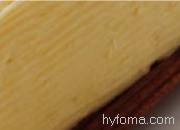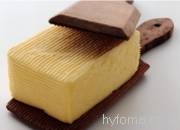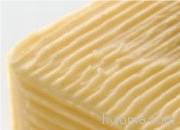
| clasificaciones > lácteos > mantequilla |
This article is not yet available in the language you selected
Butter Making
Article index
 | How cream is used in making butter | |
 | (Possible) results: Butter, butter milk, butter oil and pure butter fat |
Medium-fat butter has a fat content of between 39% and 41%.
Fat acts as a taste enhancer. It is also a high-quality source of energy.
Butter has been made for centuries through manual churning in order to make milk fat storable. Butter keeps for around 6 weeks at a temperature of 4°C.
How cream is used in making butter
The basic ingredient used in butter making is the cream obtained from milk. Since the fat contained in the cream enhances any taste, gaseous impurities quickly lead to a strong and unpleasant taste. The cream can be fully degassed to prevent these tastes.Butter can be produced in batches or continuously using modern machines.
The cream is pasteurized after extraction 95°C. A distinction is made between sour cream butter and sweet cream butter. In order to produce sour cream butter, the cream is injected with lactic acid bacteria which cause acidification.
During the churning process, the cream is heated and either poured into the churn (in batches) or transported (continuously) through the butter worker.
The fat globules in the cream are destroyed in these machines through mechanical action and the contents run together to form the so-called butter grain.
(Possible) results: Butter, butter milk, butter oil and pure butter fat
Butter milk is produced as a secondary product of churning and has a residual fat content of around 0.5%.The residual fat content and thus the process yield depend on the time of the year.
The butter milk is removed and the butter is kneaded. The butter grains are combined during kneading to form a solid mass. This may also take place in a vacuum in order to obtain a more compact butter.
Other products can be obtained, for example butter oil (99.3% milk fat) and, as an even more refined product, pure butter fat (99.8% milk fat). Several separation steps and homogenization or heat treatment are required in this case. The final product is called AMF (Anhydrous Milk Fat) and keeps for up to one year at a temperature of -25°C.
 back to top
back to top

 companias
companias


